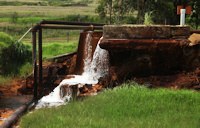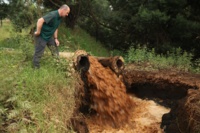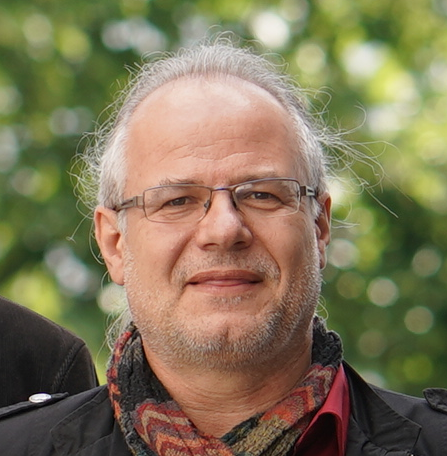Lappeenranta University of Technology
Water Treatment in Mining (LUT BJ03A2030)
From Ground Water to Mine Water
Lappeenranta, April 24 — 28, 2017
Course Material
- only registered students will get a link to the course material
Programme
| start | end | April 24, 2017 | April 25, 2017 | April 26, 2017 | April 27, 2017 | April 28, 2017 |
|---|---|---|---|---|---|---|
| 9:00 | 9:45 | Treatment | ||||
| 9:45 | 10:30 | Treatment | ||||
| 10:30 | 11:00 | break | ||||
| 11:00 | 12:00 | Treatment | ||||
| 12:00 | 13:00 | Introduction | Mine Flooding | Geochemistry | Treatment | Treatment |
| 13:00 | 13:30 | Introduction | Mine Flooding | Geochemistry | break | Treatment |
| 13:30 | 14:00 | break | break | break | Trailblazer* | break |
| 14:00 | 15:00 | Technical Terms | Geochemistry | Geochemistry | Trailblazer* | Diskussion |
| 15:00 | 16:00 | Technical Terms | Geochemistry | Modelling | Diskussion |
Lectures will be held in room | sali 2208.
* dissenting location: building 2, floor 3, near the cafeteria SkyBar. End will be at around 14:30.
Themes
 In the last decades worldwide efforts have been conducted to understand acid mine drainage and its abatement. Yet, passive and active treatment methods as well as enhanced natural attenuation are still not fully understood and need further investigations. This course will introduce mine water issues in general and treatment methods for contaminated mine water. During the introduction you will learn basic geochemical mechanisms that can be observed in mines and result in ground or surface water contamination. Simple case studies shall exemplify which environmental impacts are caused by mining and how the hydrogeological and ecological surroundings might be altered and can be limited. Usually, hydrogeologists and non-mining engineers are not familiar with the mining terms. This is also true for the situation underground, especially if it comes to historic mining and to acid mine drainage. Therefore, the first part of the workshop aims to provide a general understanding of the terms and conditions in a mining environment. To predict or calculate mine flooding, it is necessary to understand the hydrogeological situation on-site. Several theoretical methods and case studies will be described and discussed along with proper sampling technics. To develop the most advantageous treatment strategy, the temporal and spatial development of a mine flooding have to be understood. Similarly, it is necessary to understand the chemical development of mine flooding. Based on that data a conceptual model and a treatment option can be planned. The last part of the course will give an introduction to mine water treatment.
In the last decades worldwide efforts have been conducted to understand acid mine drainage and its abatement. Yet, passive and active treatment methods as well as enhanced natural attenuation are still not fully understood and need further investigations. This course will introduce mine water issues in general and treatment methods for contaminated mine water. During the introduction you will learn basic geochemical mechanisms that can be observed in mines and result in ground or surface water contamination. Simple case studies shall exemplify which environmental impacts are caused by mining and how the hydrogeological and ecological surroundings might be altered and can be limited. Usually, hydrogeologists and non-mining engineers are not familiar with the mining terms. This is also true for the situation underground, especially if it comes to historic mining and to acid mine drainage. Therefore, the first part of the workshop aims to provide a general understanding of the terms and conditions in a mining environment. To predict or calculate mine flooding, it is necessary to understand the hydrogeological situation on-site. Several theoretical methods and case studies will be described and discussed along with proper sampling technics. To develop the most advantageous treatment strategy, the temporal and spatial development of a mine flooding have to be understood. Similarly, it is necessary to understand the chemical development of mine flooding. Based on that data a conceptual model and a treatment option can be planned. The last part of the course will give an introduction to mine water treatment.
Introduction, Historical Background
Within the introduction the fundamental geochemical mechanisms that occur in mines and result in groundwater contamination will be explained. Participants with a hydrogeological as well as those with a mining background will have a common mining-hydrogeological vocabulary after the first part of the lecture. Examples will demonstrate the effects of mining towards groundwater and the environment as well as the methods in which way these effects can be remediated or avoided.
Mining methods, Technial terms
Hydrogeologists often are not adequately familiar with the vocabulary used in mining. Furthermore, not each hydrogeologist is familiar with the conditions underground, especially in historical mines with acid mine drainage. These deficits will be eliminated during this part of the lecture by describing and explaining technical terms.
Mine Water Geochemistry
Geochemical reactions are the fundamental requirement to understand the processes that go on during and after the mining activities. On the basis of the interactions of rock, oxygen and mine water the development of typical secondary minerals will be explained. There will also be an introduction to the processes of disulfide oxidation as well as the development and methods to avoid acid mine drainage.
Prediction of Mine Flooding
 To develop the most advantageous mine water treatment system, it is necessary to predict the temporal and spatial development of the mine flooding. At this point, the most important models which can be used for mine flooding predictions will be presented. Selected examples will demonstrate the results of those predictions.
To develop the most advantageous mine water treatment system, it is necessary to predict the temporal and spatial development of the mine flooding. At this point, the most important models which can be used for mine flooding predictions will be presented. Selected examples will demonstrate the results of those predictions.
Mine Water Treatment
Finally, the fundamental processes of conventional and alternative mine water treatment will be explained. The most common methods of mine water treatment of both groups will be explained and examples will demonstrate the processes involved in mine water treatment plants.
About the lecturer
 Prof. Dr. habil. Christian Wolkersdorfer is a member of the Academy of Sciences South Africa (ASSAf) and has 32 years of professional experience. He is a mining and geothermal hydrogeologist specialising in mine water tracer tests, mine water geochemistry and remediation. Christian Wolkersdorfer currently holds the South African Research Chair for Acid Mine Drainage Treatment at the Tshwane University of Technology in Pretoria. He has taught hydrogeology, mining hydrology, and tracer hydrology at Ludwig-Maximilians-Universität Munich, at Bergakademie Freiberg, Germany and within the AEG master course of Tübingen University. He held the Industrial Research Chair in Mine Water Remediation & Management at Cape Breton University, Nova Scotia, Canada. He received his Master’s Degree and PhD from Clausthal University, Germany and habilitated at Bergakademie Freiberg, Germany. A world leader in mine water remediation and management projects, Prof Wolkersdorfer has conducted and initiated several projects related to mine water and hydrogeology in Canada, Germany, Austria, Slovenia, Brazil, the United Kingdom, South Africa, Finland and Turkey. Prof Wolkersdorfer is also the Technical Editor for the Journal “Mine Water and the Environment” as well as the President of the International Mine Water Association (IMWA), the Industry-Academia coordinator for the Mine Water Division of WISA (Water Institute of Southern Africa) and he is a member of the Global Alliance. He published or edited more than 230 papers and book chapters relating to mining, mine water and hydrogeology.
Prof. Dr. habil. Christian Wolkersdorfer is a member of the Academy of Sciences South Africa (ASSAf) and has 32 years of professional experience. He is a mining and geothermal hydrogeologist specialising in mine water tracer tests, mine water geochemistry and remediation. Christian Wolkersdorfer currently holds the South African Research Chair for Acid Mine Drainage Treatment at the Tshwane University of Technology in Pretoria. He has taught hydrogeology, mining hydrology, and tracer hydrology at Ludwig-Maximilians-Universität Munich, at Bergakademie Freiberg, Germany and within the AEG master course of Tübingen University. He held the Industrial Research Chair in Mine Water Remediation & Management at Cape Breton University, Nova Scotia, Canada. He received his Master’s Degree and PhD from Clausthal University, Germany and habilitated at Bergakademie Freiberg, Germany. A world leader in mine water remediation and management projects, Prof Wolkersdorfer has conducted and initiated several projects related to mine water and hydrogeology in Canada, Germany, Austria, Slovenia, Brazil, the United Kingdom, South Africa, Finland and Turkey. Prof Wolkersdorfer is also the Technical Editor for the Journal “Mine Water and the Environment” as well as the President of the International Mine Water Association (IMWA), the Industry-Academia coordinator for the Mine Water Division of WISA (Water Institute of Southern Africa) and he is a member of the Global Alliance. He published or edited more than 230 papers and book chapters relating to mining, mine water and hydrogeology.




